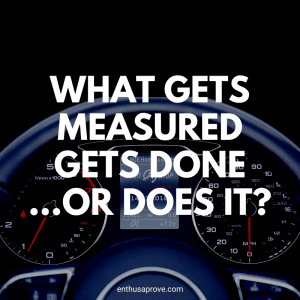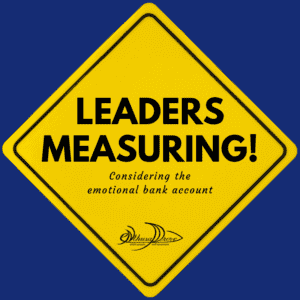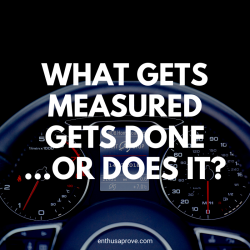 I recently had a senior manager in charge of continual improvement share with me how important metrics were, (as if I hadn’t heard that before) and she ended her pitch with the very firmly stated
I recently had a senior manager in charge of continual improvement share with me how important metrics were, (as if I hadn’t heard that before) and she ended her pitch with the very firmly stated
“Because what gets measured gets done.”
That is one of the most frequently misquoted statements I hear. It catches my attention because it’s so not true.
This statement, ‘what gets measured gets done’ is a misstatement of the other quote, frequently attributed to Peter Drucker, that is, “what gets measured gets managed.”
I am not a Peter Drucker expert; I respect his advice and have read articles by him. However, from what I’ve read, this quote seems to be out of context. Actually, it appears that Drucker didn’t even write that.
But back to the intent of this continual improvement manager:
Do you believe that only what gets measured gets done?
Let’s talk dashboards.
- Do I drive a certain number of miles because I have an odometer that measures it or because that happens to be the distance to grandma’s house?
- Do I go a certain speed because I’m measuring it or do I check the speedometer to learn if I’m within the speed limit?
The dashboard informs me of the status of the car, speed, safety, and systems. While warnings influence my ability to get to grandma’s, it doesn’t affect my intention of what to do, i.e. go visit grandma.
What about the things that ‘get done’ that we didn’t measure?
I’ve seen bosses who yell, demean, disrespect, and exhibit lots of other terrible behaviors. That’s what’s getting done. Is that because he or she measures the outbursts? If ‘what gets measured gets done’, how do we explain all the stuff that is getting done, both good and bad, that is NOT being measured?
There are corporate dashboards that have a customer dissatisfaction metric. I guess we ticked off the customer because what gets measured gets done! Do you want to stop ticking off the customer? Then just stop measuring it!
I give my bride a good night kiss every night, for over 30 years now. I never measure that, and, quite frankly, if I put a metric up on the wall to make sure I do that because ‘what gets measured gets done’…well, you can just imagine how that would be received. Helllloooo sofa!
What happens when we follow ‘what gets measured gets done’?
Sitcoms are full of episodes where one spouse says “you never do such and such” and then the other spouse goes and does it in extravagant fashion. They are doing it because the spouse is measuring their relationship by that. We all immediately realize that the moment that flowers are bought, anniversary dinners are reserved, laundry is washed only because it’s being measured results in, well, a sitcom. Your team’s leadership should not be a sitcom.
If you think this isn’t happening in the business world, think about this real situation. Monthly quotas for salesmen drive whacky end of month behavior. When the monthly quota has been met, salespeople delay deliveries on purpose so that it will go into next month. Customers love when that happens. (that needed to be in the facetious font)
When I hear ‘what gets measured, gets done’ I’m inclined to hear Deming’s voice in my head about managing by the numbers and fear in the workplace. Machiavelli told us that as leaders it’s better to be feared than loved; he was right. If I can hold a number over your head to help you be afraid, then it’s the fear, not the measuring, that is getting something done.
What is a better motivation for measuring?
Measuring is for LEARNING! It’s for IMPROVING what we do, not to spur motion.
When I’m training for a sport, like running a 5k, I measure my time. I don’t run because I’m measuring. I run because I like to run 5K’s. I measure so that I LEARN how to run better. A while back we wrote a blog about an insightful teacher that found disconnected students by measuring the opposite of what she was looking for, because she understood human motivation. Her motivation was not to influence behavior, but to learn what’s unseen about the students in her class.
Measures are not about getting workers to work; measures are about helping us to LEARN how to be better leaders, to LEARN how to serve our customers better and, more critically, to LEARN how to serve those whom we lead better. That was Drucker’s intent all along. And read this blog for insight on how the quote is so misquoted, it’s actually warning us about measuring.
3 Questions Leaders Ask Before Measuring
Many business metrics are set up to drive behavior, often with unintended consequences. If a leader is instilling fear through measuring, the system will manipulate to cope with the fear. These situations do not result in higher productivity, but may give more “motion.” If you are a leader that wants to truly drive towards success (rather than create motion), ask yourself three questions about the things you are measuring.
- What’s my motivation? Am I measuring behavior to prod my team or truly learn about the system?
- Will I actually believe the measurement? We find that many leaders set up measurements and then discredit the results.
- Is the measure of counting something convenient or meaningful? Measures give us feedback about process performance. Counting output is easy but tells us very little that we can act upon to improve how the team operates.
I believe that enabling joy in work is the key to project success. That doesn’t mean I’m against measuring. It’s about realizing and using measures to accelerate learning, because, down deep, there is joy in learning how to connect, create and contribute.
Related Posts:








A truer blog never has been written! Paul, thank you for a entertaining and valuable at a time when I am up to my ears in indices, measures and metric definition sheets. Be well!
Lyn – Thanks for your thoughts! I hope all is well with you, your job and your family. Be well.